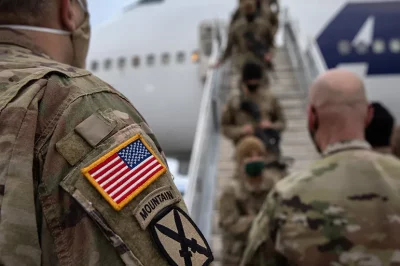“War is a continuation of Politics by other means.”
(Carl von Clausewitz)
The Political government of a state considers war a tool to achieve its political objectives. A waiver of war is a permit that the government issues to the military for implementing the will of the state. Strategy and tactics are the major cornerstones of success in any war, whether on a large or small scale. Strategy helps you achieve your objectives more comprehensively or diversely. Small wars are fought between two matchless parties where one holds great military dominance over the other, either an insurgent party or a non-state actor.
In small wars, the losing or winning part lies in the strategy of how you are going to confront your enemy rather than the strong traditional power. In small wars, the opposing party’s political narratives, strengths, and weaknesses act as the driving force that pushes them toward success or failure.
The U.S. started another episode of small war in Afghanistan after the defeat in the Vietnam War. President George W. Bush declared the Global War on Terror in Afghanistan as a reaction to the 9/11 Twin Towers terrorist attacks. In that attack, the death toll crossed the threshold of 2,500. Osama bin Laden did the brainstorming for the 9/11 attack, as he was the leader of the Al-Qaeda network at the time.
After the withdrawal of the Red Army from Afghanistan during the Cold War, it went into an intrastate conflict. The Taliban had success and emerged as an Islamic militia. They took over control of Kabul in 1996 and got engaged in expanding their ideology within Afghanistan. The U.S. launched military operations in Afghanistan to dismantle the Taliban, who provided safe shelter to Osama bin Laden. Additional objectives were to kill Osama bin Laden and eradicate terrorism in Afghanistan.
The U.S. toppled the Taliban regime and signed the Bonn Agreement for state-building projects to promote democracy in Afghanistan by appointing Hamid Karzai as interim government leader. The U.S. adopted an offensive strategy against the Taliban by following the Clausewitz war strategy of destruction.
Initially, the U.S. and its allied International Security Assistance Forces (ISAF) conducted operations, resulting in the assassination of Osama bin Laden in 2011. History tells us that the U.S. has always won direct confrontational wars. But the question arises: what went wrong for the U.S. in Afghanistan? As time passed, Afghanistan became a thin ice for the U.S. as counterterrorism operations turned into counterinsurgent operations.
“If you know the enemy and know yourself, you need not fear the result of a hundred battles.”
(Sun Tzu)
The Taliban embraced the strategies of Sun Tzu, and they put up the narrative that the presence of U.S. forces and collateral damage happening here are attempts to undermine the sovereignty of Afghanistan. The Taliban used the cultural and religious card that the U.S. wanted to enforce Western secularism against Islam in Afghanistan.
The Taliban depicted themselves as the protectors of Islam and Afghanistan, which helped the Taliban gain sympathy and support from the local public. The U.S. failed to shape public opinion through its narrative because it lacked knowledge about its culture and values. For the Taliban, it was a war of survival, and they adopted the guerilla strategy against the U.S. and its allied forces.
Also Read: Unraveling the root causes of the Pakistan-Iran crisis
The main aim was to prolong the war, as they were trying not to lose the war instead of winning. They used to hit and run after targeting military convoys, check posts, and the logistics of the U.S. The Taliban employed the tactics of ambush for a surprise attack during the movement of U.S. forces to cause causalities in a significant number so that they would be under substantial psychological damage. Local culture helped the Taliban to disperse themselves cozily among the local population after targeting the forces so that U.S. forces were unable to catch them.
The U.S. did not learn the lesson from history as Afghan Mujahedin used a guerrilla strategy against the Soviet Union, so they should have revised their strategy for better results against the Taliban’s guerrilla strategy. The U.S. continued to fail in it. The Taliban preferred the remote and inaccessible areas of Afghanistan for their shelter to avoid the imminent attacks.
The Taliban intentionally protracted the war to put pressure on the cost of human lives, logistics, and other means for the U.S. The ultimate aim was to manipulate the U.S. by protracting war to test their political patience. When war gets protracted, it becomes difficult for everyone to predict the outcomes of war. Terrain and climate played a significant role in the victory of the Taliban, as they were the sons of their soil and were well aware of the climate conditions and landscape.
The infrastructural development of roads was poor, which produced hindrances to the U.S. during the movement of logistics and troops. The U.S. could not conduct military operations in hot summers, cold winters, and rugged mountains. The Taliban used to attack U.S. forces in the mountains and hide themselves in the caves. U.S. forces have collapsed entirely.
In a nutshell, only conventional dominance does not ensure your success in small wars, especially against the insurgents. Body Bag Syndrome was another cause of the USA’s defeat as it was a war of choice for the U.S. Still, the causalities with no attainment of objectives had a psychological impact and altered political and public opinion. This urged the U.S. to go for the Doha agreement to withdraw U.S. forces safely. The will to fight the U.S. had ended, which ultimately took the U.S. away from Afghanistan.
Author Haseeb Ahmad is a student of Strategic Studies from National Defense University Islamabad.
** The opinions expressed in this article are solely those of the author and do not reflect the views or position of World Affairs Insider. The organization neither endorses nor takes responsibility for the content of this article and its accuracy.







